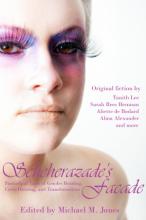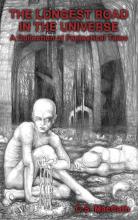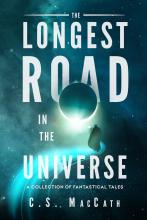A misfit wanderer sings change into the lives of a church congregation in "The Daemons of Tairdean Town." Available in Scheherazade’s Façade from Circlet Press, Inc.
MacCath, C.S. 2012. "The Daemons of Tairdean Town." In Scheherazade’s Façade, edited by Michael M. Jones, 22–41. Cambridge: Circlet Press, Inc.
MacCath, C. S. 2016. "The Daemons of Tairdean Town." In The Longest Road in the Universe: A Collection of Fantastical Tales, First Edition, 51–76. South Haven: Triskele Media Press.
MacCath, C. S. 2020. "The Daemons of Tairdean Town." In The Longest Road in the Universe: A Collection of Fantastical Tales, Second Edition, 38–56. South Haven: Triskele Media Press.
As the title suggests, this anthology features fantasy stories with characters that exist outside the gender binary. Various characters in these stories shift genders at whim, have secret selves of the opposite gender, cross dress to hide their identity, are transgender, or perform other acts of gender bending. Through the book, the stories are consistently good with strong writing, interesting multi-dimensional characters, and fascinating worlds. Here are a few of my favorites:
"The Daemons of Tairdean Town," by CS MacCath — A scarred woman drifts into a small town, singing to plants along the way, breathing life into them and the world with her tunes. She brings with her a secret self, who connects with the secret selves of others and helps them to heal...
Andrea Blythe
Stories I found of special mention: “The Daemons of Tairdean Town”, by C.S. MacCath, which has both the most sympathetic portrayal of genuinely religious people I’ve ever seen in SF and the most telling subversion of religion.
KellanSparver.com
Her Tangh-i-ness has a soft spot for ugly, crippled girls. First person makes it easy to slip inside the head of a clairsentient one for a bit especially one who hasn’t lost touch with her inner male. An ugly, crippled girl who guides the living and the dying equally from their known life to and from the great, interconnected Is-ness. Wait. And of the Daemons? Remember the less popular, less intimidating, non-computer technology definition of the word daemon, insert the word anima/animus instead and a reader makes Jung proud. Plus there is juicy daemon sex.
Her Tangh-i-Ness Presents...
After I leave a place, most people return to their lives and never again question their circumstances. Others make changes, set down rules and clear space for themselves. A few are radically changed and never look back, never regret and die old, craggy, joyful. But when I depart, all of them have genuinely chosen, sometimes for the first and last time ever.
I’m afraid this isn’t going to be a very sensible installment of Short Business because I’m a little in awe of C.S. MacCath’s "The Daemons of Tairdean Town", so I may babble.
When Piper arrives in town she’s offered accommodation at the local church – The Full Gospel Tabernacle – because she’s out of work. As soon as she arrives, she begins to work her magic on the building, the natural elements around her, and the people of the town. When describing her magic Jack, Piper’s daemon says ‘She sings to living things, or to thing that were recently alive and those things sing about life to the people that touch them.’ This unleashes the townspeople’s own daemons.
In this story’s world, everyone has a daemon - usually of the opposite sex. These daemons appear once Piper communes with the natural objects in the town, and talk to Jack about the missed opportunities and dreams their corporeal halves appear to have let go. Piper’s gift re-awakens these passions and opens up possibilities for the people around her.
The substance of "The Daemons of Tairdean Town" is very simple, but the combination of the magical concept, the focus of the story and the character relationships create something I desperately needed. Essentially, "The Daemons of Tairdean Town" is about trading your dreams for surety and taking up a default, suburban life without examining your true desires:
Few people fully respond to the impulse to spread their legs, spread their arms and spread their ideas. Instead they trade in securities; degrees in pragmatic disciplines for decent paychecks, husbands with good jobs for roofs over their heads, a couple of children to care for them when they can’t wipe their own asses anymore.
It’s not a bad life of its own accord, but it clips the feathers of their souls. Jack and me, we sew them back on where we can.
The experience of reading this story was like being recognised and written for, much like my experience of reading Kristen Cashore’s work. The importance of being aware of the life you’re making is an idea that informs my own perspective. Anyone who’s been following the blog for a while may have noticed that I often link to commentary pieces about choosing to live a single life. I’m not against marriage or partnership, but I have my issues with the way the world encourages people to approach these states. I wish there were more guidance about how to practise mindfulness when building a partnership; more advice about how to build an individual partnership that feels right to you and more interest in actively examining heteronormative domestic defaults. I also wish there was more mainstream discussion about the importance of making sure partnership is right for you before entering one.
However, I also struggle with applying the idea of mindfulness in other areas of my life. Like a lot of people, I’ve grown up in a traditional way and that influences how I behave. I find it hard to imagine actually following certain kinds of dreams. I let practicalities get in the way without being brave enough to deconstruct whether those practicalities are important. And I need stories that can help me imagine other ways of living.
So, MacCath’s story was important to me. Piper comes and frees the people of the town from sleepwalking through default lives. She gets them to imagine new dreams, sleep with new people and raise their hands in celebration.
Sometimes their new determination places them in conflict with others. Her friend Jessica realises ‘she’s sick of cooking all the meals and doing all the laundry and raising the kids by herself’, and when Jessica expresses that to her husband Robert he hits her. When Jessica finds out that Piper is the reason she released these feelings she isn’t exactly grateful. Piper is also distraught, but as her daemon says it’s not their fault Robert is beating Jessica; if he reacts violently that’s on him.
However, Piper doesn’t force freedom on anyone (although she does manipulate a couple of people in the church to make the atmosphere a bit livelier). She unlocks Jessica’s urge for freedom, but never takes her choice away from her. After an internal struggle, Piper leaves it up to Jessica to report Robert to the police. And in the end Jessica does send her husband to jail. While this approach might not fit every example of domestic abuse, it turns out to be the right way forward in this case. MacCath’s story is about enabling people to see their choices; as Piper articulates when she says ‘I believe people are better off free, even if it hurts them to get that way…’.
"The Daemons of Tairdean Town" is a cracking story – compact and emotively written. You’re going to fall for the characters in super quick time and then hate me for telling you about this story because there isn’t any more of this world for you to read about. I particular want more of Jack and Piper’s further adventures with Helen and Hank. And I want more of Luke, Robert’s daemon, spending time with everyone. One of my favourite passages from the novel revolves around Luke:
Lady Business
The Daemons of Tairdean Town by C. S. MacCath is charming and heartbreaking and full of the unexpected.
lokifan.dreamwidth.org



